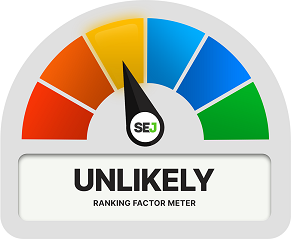Using 301 redirects is crucial when permanently moving an old webpage to a new URL. They will ensure a positive user experience by instantly connecting users to the content they are looking for, even if they were given an old URL.
But do 301 redirects affect your rankings in organic search?
This chapter will cover the relationship between 301 redirects and improved Google rankings.
More questions about Ranking Factors? We cover all of them in Google Ranking Factors: Fact Or Fiction.
The Claim: 301 Redirects Are A Ranking Factor
What are 301 redirects?
A 301 redirect is a server-side redirection for a permanently changed URL.
You would use a 301 redirect for the following scenarios:
- You are going from HTTP to HTTPS.
- You are moving from an old domain to a new one.
- You are optimizing URL slugs for existing posts and pages.
- You are moving to a new website platform, and your pages will change from https://example.com/page.html to https://example.com/page/.
Most of the discussion surrounding 301 redirects focuses on whether PageRank would transfer from the old URL to the new URL.
Or, if inbound links existed for the old URL, would they automatically be applied to the new URL?
The Evidence Against 301 Redirects As A Ranking Factor
Not much is officially said about 301 redirects as a ranking factor.
In 2012, Matt Cutts, former head of Google’s Webspam team, said that Google would follow an unlimited number of redirects from one page to another.
Google will even make multiple hops if a page is redirected to another page, then redirected again and again. He noted that the Googlebot might stop following redirects after four to five hops.
In 2013, Cutts confirmed that a small percentage of PageRank is lost in 301 redirects. While some SEO professionals quote a loss of 15%, Cutts doesn’t say there is a specific percentage.
In 2016, Gary Illyes shared this comment about redirects. Thanks to Andy Beard for surfacing this tweet.
“30x redirects don’t lose PageRank anymore.”
In 2018, John Mueller was asked if Google would see 100 domains redirected to one as spam. His response:
“Redirect away. I doubt you’d get SEO value from that, but that’s kinda up to you. For example, if you might use a domain name in an ad campaign to have a memorable URL to show, even if it ends up redirecting to your main site in the end.”
In 2019, Mueller further confirmed that HTTPS is a lightweight ranking factor when discussing how SSL affects a website’s search rankings. The redirection of a website from HTTP to HTTPS is the closest way 301 redirects are linked to ranking factors.
In January 2020, Mueller discussed the possible SEO implications of stringing multiple 301 redirects together. Redirects can negatively impact speed. Also of note: Google will only crawl up to five “hops” in a redirect chain.
In April 2020, Mueller answered a question submitted to #AskGoogleWebmasters about how long it takes Google to rank a new URL instead of the old one that has been 301 redirected. Mueller explains that 301 redirects signal canonicalization, but that Google also uses other factors for canonicalization.
He mentions a previous video discussing how Google chooses the right canonical URL. He then says that you can help Google determine the preferred destination URL beyond a 301 redirect by updating internal links, sitemaps, and other references to the original page to reference the new URL.
In June of 2021, Mueller discussed how Google could choose a new URL over an old one without a redirect.
Suppose you copy content from an older URL to a newer URL and don’t place a redirect. In that case, Google may still be able to choose the new URL as canonical due to other signals (internal links, sitemap links, etc.).
In July of 2021, Gary Illyes advised that 301 redirects stay in place for at least a year, giving Google time to ensure ranking signals are properly passed to the new URL.
Google also regularly updates its guide to redirects and Google Search in its Advanced SEO documentation – noting that server-side redirects are best.
“If you need to change the URL of a page as it is shown in search engine results, we recommend that you use a permanent server side redirect whenever possible. This is the best way to ensure that Google Search and people are directed to the correct page.”
They also add in the FAQ for changing URLs that 301 and 302 redirects do not result in a loss of PageRank.
Our Verdict: 301 Redirects Are Not Likely A Ranking Factor
301 redirects may not boost the rankings of your webpages, but they can ensure that both Google and search users are directed to the content you want them to find.
They also ensure you don’t lose the ranking signals built to old URLs when moving them to new ones.
But while they are essential for signaling the proper canonical and passing ranking signals, we have no official confirmation that 301 redirects are a ranking factor.
Remember that just because something isn’t a Google Ranking Factor doesn’t mean it’s unimportant. You should still manage redirects carefully and avoid technical issues such as redirect chains.
Want to learn about other ranking factor myths? Check out the latest version of SEJ’s comprehensive Google Ranking Factors ebook.
Featured Image: Paulo Bobita/Search Engine Journal
![Ranking Factors: Fact Or Fiction? Let’s Bust Some Myths! [Ebook]](https://cdn.searchenginejournal.com/wp-content/uploads/2022/08/rf-ebook-download-banner-62e8c6126ffe8-sej.jpg)

